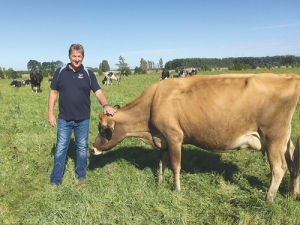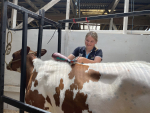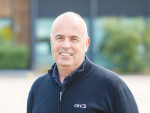Hank Lina's dairy career began in the 1980s with the NZ Farm Cadet Scheme, and after a gap year in the Netherlands he returned to Waikato to work as a herd manager for three years, progressing to contract milking then joining Livestock Improvement as its Otago regional officer.
For ten years he has worked with Maffra Herd Improvement and NZ Genetics in Australia, been an AI consultant in Ireland and acting general manager of a large dairy operation in Missouri, US, before returning to NZ as a CRV Ambreed regional sales and service manager. He was appointed World Wide Sires' NZ general manager late in 2015.
Lina spoke to Dairy News about why he's working for a US company and what its genetics have which others don't.
Dairy News: What drew you to head a US genetics company?
Lina: World Wide Sires was formed in the US 45 years ago and is now one of the largest distributors of dairy genetics around the world. It's owned by two of the largest farmer owned AI cooperatives in the world – Select Sires and Accelerated Genetics -- operating for 50 and 70 years respectively 51,000 farmer members and sales exceeding 19 million straws.
World Wide Sires has been in NZ for at least 30 years so we're part of the industry. I believe now, with the volatility we're seeing in dairy payout, that the company's genetics have more relevance for Kiwi farmers than ever.
I believe the big player in the genetics market has hedged itself into a one-size-fits-everything position in breeding worth, limiting the amount of choice for NZ farmers.
We're saying there is another way which will help you reduce headcount and improve production.
Dairy News: Are you challenging breeding worth (BW)?
Lina: Breeding worth tends to be the currency for dairy breeding in this country but it's not the only way to judge great genetics.
Many farmers with moderate to high BW herds are saying they're not seeing this translated into milksolids, fertility, longevity or strong, functional conformation. They quite rightly ask why herds producing well over the national average of 370kgMS have low to very low BW.
Most of our customers produce well over the national average and they focus on what works best for them which, nine times out of ten, is very good type (capacity, legs, feet, udders and moderate stature) transmittable components and fertility.
BW is a measure of profitability but it's not the only measure. The measure that speaks most loudly to farmers is what they see in the paddock, in the vat and in their bank balance.
Dairy News: In 2005 the Dexcel Holstein Friesian strain trial found that high BW cows of predominantly NZ ancestry were more profitable than high BW overseas bulls across the range of pasture based systems. What's your response?
Lina: The issues identified by the strain trial originated from the influx of European and US Holsteins which occurred a decade earlier and which weren't suited to an all-grass low-cost system.
The environment couldn't be more different today than in 2005. We now have five production systems and I doubt the 2005 trial results have any relevance for farmers today using systems 3 to 5. The fact is our industry is evolving rapidly and these new systems require a different type of cow.
Dairy News: There was also a perception, at the time of the strain trial, that overseas genetics tended to be large, were not fertile and wouldn't last in commercial herds. What's your response?
Lina: Since the 1970s the focus of the breeding programmes in the US was milk production and type – North American cattle becoming the highest production and type cattle in the world.
As with most things in life, however, great focus and progress in one area often leads to a loss in another and by the 1990s the extreme focus on production led to larger cows and a slow but steady decline in cow fertility. This concerned the US AI industry and at the end of the 1990s decisive action was taken to make a radical change in sire selection towards a more balanced and highly fertile animal.
The US industry listened and responded. Today the patronage of farmers around the world confirms that they know World Wide Sires genetics are proven to be amongst the most fertile in the world in both daughter fertility and semen fertility. We are also delivering a more moderately sized animal which calves easily for a healthier lactation of high milksolids. The end result is more profitable herds.
Dairy News: Isn't World Wide Sires "just for breeders"?
Lina: A lot of breeders around the world rely on our genetics but so do thousands of commercial farmers.
Our genetics are purebred and pedigree but no farmer would argue against the need for this. Right now, on many Kiwi farms, farmers are telling us they are concerned that they can't rely on the outcome of crossbred to crossbred breeding. All farmers understand hybrid vigour but there is growing concern that this has been lost and you will see a lot of crossbred herds with huge variation in size, colour and production.
Farmers are asking what the answer is, and we're saying we've got the solution – highly profitable sires which will address and correct those issues.
Put as simply as possible, mating a smaller-than-you-like crossbred cow over one of our moderately sized Holsteins or perhaps a larger Jersey bull (with all the goods) will give you a heifer that's closer to the size you like, looks more like the kind of cow you like and milks more like the kind of cow you like. That's just the first crop.
Dairy News: Are World Wide Sires' sires proven or genomic?
Lina: Our offering includes daughter proven bulls and genomically selected bulls. With at least 30,000 males and 35,000 females used as genomic predictors, we have the world's most accurate genomic predictions, with reliabilities for Holsteins exceeding 70%. The current Holstein genomic database includes at least 825,000 females and 170,000 males – the largest genomic database in the world with a staggering 10,000+ new animals being tested every month.
Dairy News: Are you challenging the big players in NZ's dairy genetics?
Lina: No, we are not really interested in a race or competition with our competitors. If anything, the big players probably need us as much as farmers do. I think it is sad that the two big players are using each other's genetics and have narrowed the gene pool to the point where it is nigh impossible to mate your cows without an inbreeding report – all for the sake of high BW.
Our intention is to let every dairy farmer in NZ know there is an alternative that can work for them as well if not better.
Imagine that BW was the 'Boeing Dreamliner – the greatest plane ever built' – and World Wide Sires was the 'Airbus A380'. Would Boeing be telling the world that the A380 was inefficient, too large, usually too white and wouldn't last? No of course it wouldn't be, because just like cows here in NZ there is more than 'one way to do it and do it well'.
Dairy News: Many farmers are reviewing their farming systems to get through this downturn. What's your advice?
Lina: Many years ago when I was a farm cadet my boss told me "when the payout is high, produce more, and when the payout is low, produce more". This doesn't always mean increasing the herd size and buying in feed.
If there was ever a time to reduce stock numbers and increase per cow production, it's now.


















